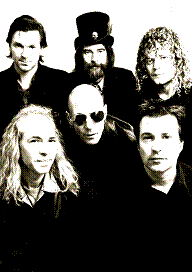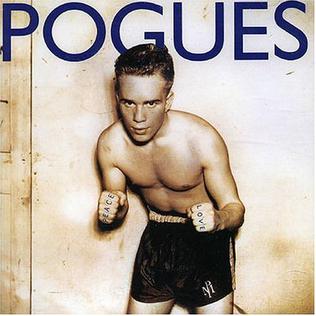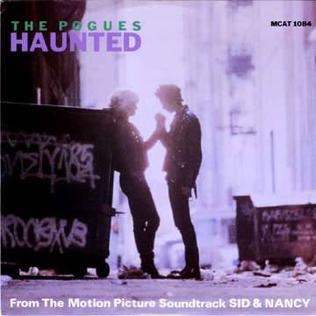
The Pogues were an English or Anglo-Irish Celtic punk band fronted by Shane MacGowan and others, founded in King's Cross, London, in 1982, as Pogue Mahone—an anglicisation by James Joyce of the Irish phrase póg mo thóin, meaning "kiss my arse". Fusing punk influences with instruments such as the tin whistle, banjo, Irish bouzouki, cittern, mandolin and accordion, the Pogues were initially poorly received in traditional Irish music circles—the noted musician Tommy Makem called them "the greatest disaster ever to hit Irish music"—but were subsequently credited with reinvigorating the genre. The band later incorporated influences from other musical traditions, including jazz, flamenco, and Middle Eastern music.

Shane Patrick Lysaght MacGowan was a British-born Irish singer-songwriter and musician known as the lead vocalist and primary lyricist of Celtic punk band the Pogues. He also produced solo material and collaborated with artists including Joe Strummer, Nick Cave, Sinéad O'Connor, and Cruachan. Known for his exceptional songwriting ability and his heavy alcohol and drug use, MacGowan was described by The New York Times as "a titanically destructive personality and a master songsmith whose lyrics painted vivid portraits of the underbelly of Irish immigrant life".

The Popes are a band originally formed by Shane MacGowan and Paul "Mad Dog" McGuinness, who play a blend of rock, Irish folk and Americana.

If I Should Fall from Grace with God is the third studio album by Celtic folk-punk band the Pogues, released on 18 January 1988. Released in the wake of their biggest hit single, "Fairytale of New York", If I Should Fall from Grace with God also became the band's best-selling album, peaking at number three on the UK Albums Chart and reaching the top ten in several other countries.

Red Roses for Me is the debut studio album by the London-based band the Pogues, released on 15 October 1984. It was produced by Stan Brennan, who had managed the Nipple Erectors/The Nips and Rocks Off Records shop in London.
Caitlín O'Riordan is a British musician. She played bass guitar for the Irish punk/folk band the Pogues from 1983 to 1986. She later played with Elvis Costello as well as Bush Tetras and several other projects. She uses the name Rocky O'Riordan on social media and for her Sirius-XM radio show, The Rocky O'Riordan Show.

Hell's Ditch is the fifth studio album by The Pogues, released on 1 October 1990, and the last to feature frontman Shane MacGowan as a member.
Roddy McCorley was an Irish nationalist from the civil parish of Duneane, County Antrim, Ireland. Following the publication of the Ethna Carbery poem bearing his name in 1902, where he is associated with events around the Battle of Antrim, he is alleged to have been a member of the United Irishmen and claimed as a participant in their rebellion of 1798.

Waiting for Herb is the sixth studio album by the Pogues, released in 1993, and their first without lead singer Shane MacGowan.

Peace and Love is the fourth studio album by the Pogues, released in July 1989.

Peter Richard "Spider" Stacy is an English musician, singer, songwriter, and actor. He is best known for playing tin whistle and sometimes singing for The Pogues.

"Haunted" is a 1986 single by The Pogues. It was featured on the Sid and Nancy Soundtrack, the original soundtrack for the movie Sid and Nancy. It reached chart position #42 in the UK. Originally sung by Cait O'Riordan, in 1995 the song was re-recorded as a duet between former Pogues vocalist Shane MacGowan and Sinéad O'Connor for the Two If by Sea/Stolen Hearts soundtrack, this time reaching #30 in the UK. The original version was included on disc 1 of the 2008 compilation "Just Look Them In The Eye And Say... POGUE MAHONE!!"

The Best of the Pogues is a greatest hits album by The Pogues, released in September 1991. The album was dedicated to the memory of Deborah Korner.

The Crock of Gold was the second and final full-length album by Shane MacGowan and the Popes and was released in November 1997 on ZTT Records. The Crock of Gold followed The Snake, MacGowan's first solo album after the breakup of The Pogues, and was less critically acclaimed than its predecessor. The album is named for the novel by Irish writer James Stephens. It is the last full studio album MacGowan recorded before his passing in November 2023.

Poguetry in Motion is an EP by The Pogues, released on Stiff Records in the UK on 24 February 1986, and in the US & Canada on MCA Records. It was the band's first single to make the UK Top 40, peaking at number 29 and the first Pogues recording to feature Philip Chevron and Terry Woods.

Outlaw Heaven is the second studio album by London-Irish rock band The Popes, which was originally due for release in September 2008, but was delayed until May 2009. The sound has been compared to Thin Lizzy and Van Morrison.
Ronnie Kavanagh, known by his stage name Ron Kavana, was an Irish singer, songwriter, guitarist and multi-instrumentalist, and band leader. Born in the County Cork town of Fermoy, he was the son of an Irish father and an American mother from Chicago with Cajun roots.

Kirsty Anna MacColl was an English singer and songwriter, daughter of folk singer Ewan MacColl. She recorded several pop hits in the 1980s and 1990s, including "There's a Guy Works Down the Chip Shop Swears He's Elvis" and cover versions of Billy Bragg's "A New England" and the Kinks' "Days". Her first single, "They Don't Know", had chart success a few years later when covered by Tracey Ullman. MacColl also sang on a number of recordings produced by her then-husband Steve Lillywhite, most notably "Fairytale of New York" by the Pogues. Her death in 2000 led to the "Justice for Kirsty" campaign.

The Very Best of the Pogues is a greatest hits album by The Pogues, released in April 2001.

Essential Pogues is a greatest hits album by The Pogues, released in November 1991.

















